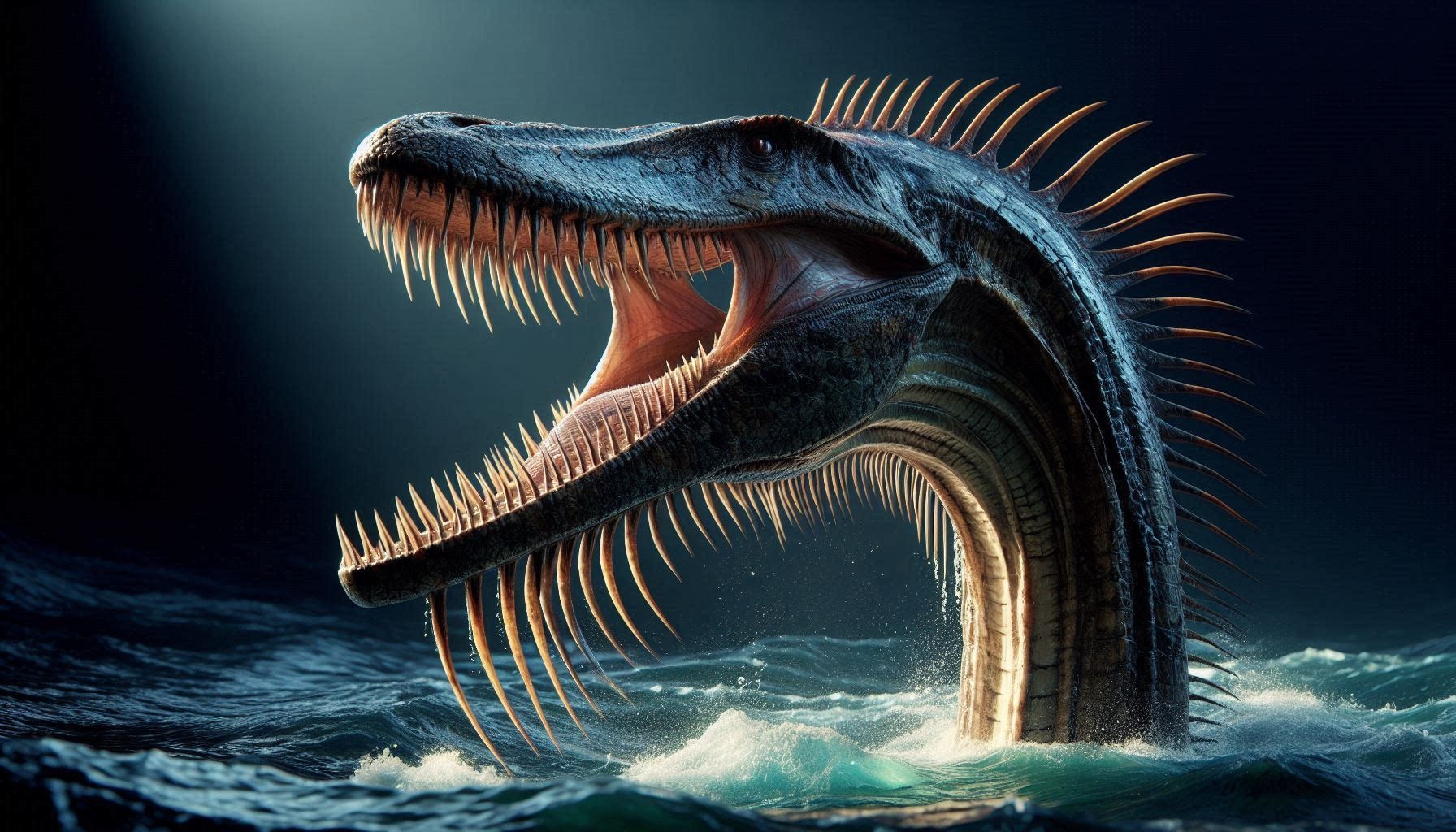Edward Brian McCleary's Escape from a Sea Monster

This happened in March of 1962 in the waters around Pensacola, Florida.
Ocala Star-Banner Account
The March 26th, 1962 edition of the Ocala Star-Banner (link below) published a brief article entitled 4 Teenage Skindivers Still Missing After Raft Is Abandoned.
The four teenages were Bradford Rice, 14, Warren Felley, 16, Eric Ruyle, 16, and Larry Stuart Bill, 17.
They, along with Edward Brian McCleary, 16, were skindiving from a raft in the Gulf of Mexico when the tide began carrying them out to sea.
McCleary was found sleeping on a beach the next day. The raft washed ashore with face masks, shoes, and fins inside.
McCleary says the boys tried to moore the raft to a buoy but failed, after which they abandoned the raft and attempted to swim to shore. He says that he, Bill, and Ruyle separated while swimming to shore.
Fate Magazine Account
In the May 1965 edition of Fate Magazine, McCleary published an article entitled My Escape from a Sea Monster. This article contains more details than the official press release.
On March 24, 1962 the five boys set out in a seven-foot Air Force life raft to the wreck of the USS Massachusetts. This is an above water wreck on a sandbar about two miles from the coast.
McGeary described the weather as “a perfect day for skin diving” and “not a cloud in the sky.” The water was calm.
The boys took turns paddling towards the wreck.
However, the weather rapidly deteriorated. White caps formed upon the water and the sky began to grey. The breeze was picking up.
The boys decided to give up on the wreck and make it back to shore.
Most of them would never make it.
The tide began to carry the raft out into the open ocean. Two of the boys jumped out in an attempt to push the raft while the other two rowed, but it didn’t help and they gave up.
They tried to wave down a passing boat but it didn’t stop.
Next they tried to moore to a buoy, but this failed as well. The buoy was so large and the waves so powerful by this time the boys had to leap from the raft to avoid being smashed.
Beyond the buoy they found the raft flooded. They managed to get back in and get rid of most of the water.
It got dark and began to rain as the current pulled them past the wreck of the USS Massachusetts and out to sea.
After a time the wind and the rain and the waves subsided and a thick fog rolled in. McCleary describes the silence and stillness, writing, “not a wave rippled, not a fish broke water, not a seagull called.”
He said that for the first time in his life he was really scared.
Rice said, “we’re dead. We died in that storm.”
But Ruyle assured him that they would be fine.
Visibility was limited to 25 feet and there was no wind. McCleary says the water was unusually warm.
Larry suddenly said, “Shhhh, I hear a boat or something.” As they listened the air became filled with the odor of dead fish. They heard a large splash about 40 feet away. The wave that followed was large enough to break over the side of the raft.
They heard a second splash, and through the fog were able to make out an object that looked like a telephone pole with a bulb on top. It was about 10 feet out of the water.
Then the object bent in half and dove under the water. There was a period of silence followed by a “high-pitched whine” coming out from the fog.
At this point the boys panicked. They put on their fins and dove into the water. The surface was covered with patches of brown, crusty slime.
The group swam towards the wreck, with McCleary and Ruyle in the lead. Behind them they could hear splashing and hissing. Although the fog was clearing, it had begun to rain again. It was getting dark and the waves were picking up.
The first scream lasted maybe half a minute. Felley cried, “it’s got Brad!” His voice was suddenly cut off.
McCleary yelled back to Felley and Rice but there was no response.
Bill was now swimming with Ruyle and McCleary. Some time passed before McCleary became aware that Bill was no longer with them.
Then a flash of lightning revealed the wreck of the Massachusetts. Another flash revealed Ruyle swimming ahead of McCleary towards the ship.
Then the telephone-pole creature surfaced next to Ruyle. It had two small eyes. It opened its mouth and fell upon Ruyle, disappearing with him below the surface.
Somehow McCleary made it to shore, although he doesn’t remember how. Next he woke up in the Pensacola Naval Base hospital.
At the hospital, he told his story to the director of Search and Rescue, who informed McCleary that none of the others had been found.
The Fate Magazine article has an epilogue stating that the press coverage did not match McCleary’s story.
A body washed ashore a week later, which McCleary identified as Brad Rice “to the best of my knowledge.”
The article ends by saying that after the incident McCleary “had a nervous breakdown but recovered and was able to resume his life in about three months.”
Questions
What happened? Were they really taken by a sea creature? Or did the “nervous breakdown” make him imagine the event?
Sources
“My Escape from a Sea Monster”
Fate Magazine, May 1965 (Vol. 18, No. 5)
Ocala Star-Banner - Mar 26, 1962:
Edward Brian McCleary (February 13, 1946 – February 24, 2016) Obituary
https://www.dignitymemorial.com/obituaries/jacksonville-fl/edward-mccleary-6819524
Wreck of the USS Massachusetts (BB-2):
https://en.wikipedia.org/wiki/USS_Massachusetts_(BB-2)
Adventures in Cryptozoology: Hunting for Yetis, Mongolian Deathworms and Other Not-So-Mythical Monsters by Richard Freeman: